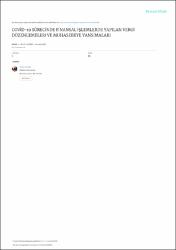Covid-19 sürecinde finansal işlemlerde yapılan vergi düzenlemeleri ve muhasebeye yansımaları

Göster/
Erişim
info:eu-repo/semantics/openAccesshttp://creativecommons.org/licenses/by/3.0/us/Tarih
2020Üst veri
Tüm öğe kaydını gösterÖzet
Covid-19 küresel salgını tüm dünyada olduğu gibi Türkiye’de de başta sağlık sistemi, sosyal hayat, eğitim sistemi gibi pek çok
alanda olumsuz etkilere sebep olmuştur. En önemli etki alanlarından birini ise ekonomi oluşturmuştur. Her olağanüstü dönemde
olduğu gibi piyasaların aksaması ve işleyişinin bozulması finansman ihtiyacını doğurmuş, devlet ekonomik destek paketleriyle bu
ihtiyacı karşılamaya çalışmıştır. Ekonomiyi toparlamak ve üretim açığını kapatabilmek için vergi ve sigorta prim borcu ertelemeleri,
kısa çalışma ödeneği ve sosyal yardımlar gibi belirli ekonomik enstrümanlar devreye sokulmuştur. Devlet harcamalarının artması
devlet bütçesine mali yılbaşında planlananın dışında ek bir maliyet yüklemiştir. Söz konusu ek maliyet ise ek gelir kaynağı
gereksimini ortaya çıkarmış ve öz finansman kaynağı olarak ek vergi artışlarını beraberinde getirmiştir. Son yapılan düzenlemerle
birtakım finansal işlemler üzerinden tevikat yoluyla alınan Gelir Vergisi oranları ile Banka ve Sigorta Muameleleri Vergisi (BSMV)
oranlarında arttırıma gidilmiştir. Bu çalışmanın amacı, belirli finansal işlemler üzerine getirilen vergi artışlarının kapsam, amaçlarını
ve etkilerinin değerlendirilmesidir. Aynı zamanda muhasebe sistemine yansımalarının ortaya konulmasıdır. Nitel araştırma
yöntemlerinden betimsel analiz yöntemi kullanılarak dökümantasyon analizi gerçekleştirilmiştir. The Covid-19 global epidemic has had negative effects in many areas including the health care system, social life and in the
education system in Turkey, as well as globally. One of the most important areas of its effect is in the economy. As in every
extraordinary period, market disruption and breakdown of the operation of the markets gave rise to the need for financing, and the
state attempted to meet this need with economic support packages. In order to recover the economy and close the production gap,
certain economic instrument, such as tax and insurance premium debt deferrals, reduced work allowances and social benefits have
been introduced. Increased state spending has put an additional cost on the state budget beyond what is planned on the fiscal new
year. The additional cost has revealed the need for additional sources of income and led to additional tax increases as a source of selffinancing. With the recent arrangements, the Income Tax rate of revenue received through deductions (withholdings) for a number of
financial transactions, together with the Banking and Insurance Transactions Tax (BSMV) rate have been increased. The aim of this
study is to evaluate the scope, objectives and effects of tax increases on certain financial transactions, and at the same time, aims to
show their effects on the accounting system.
Kaynak
Atlas JournalCilt
6Sayı
31Koleksiyonlar
Aşağıdaki lisans dosyası bu öğe ile ilişkilidir:


















